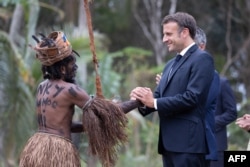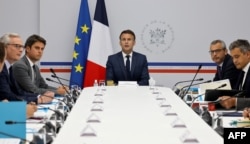Days of unrest in the Pacific archipelago of New Caledonia has left five dead and hundreds injured, prompting French authorities to declare a state of emergency.
Here is what you need to know about the crisis:
What’s going on?
Thousands of people have taken to the streets in three nights of protest, rioting and looting.
Five people are dead, including two police officers.
A state of emergency has been declared and the French military is being deployed to restore order and secure critical infrastructure like ports and airports.
All commercial flights have been cancelled, leaving tourists stranded and desperately seeking ways to get home.
Armored vehicles are now roving the streets of the capital. Protesters and fearful residents have established rival checkpoints and roadblocks.
Police efforts to impose a nighttime curfew and ban alcohol sales have so far failed to quell the violence.
Why did this happen?
Since France took control of New Caledonia in mid-1800s, there has been a fraught relationship between indigenous Kanaks and white settlers.
But this is the worst violence the islands have seen since the 1980s.
The apparent trigger was the French government’s efforts to change who can vote in New Caledonia elections.
Paris lawmakers back a constitutional change giving residents of more than 10 years a vote in provincial elections, which would add 25,000 people to the lists.
The islands’ voter roll has been frozen since 1998, something that supporters of the change say is undemocratic and disenfranchises some citizens.
“People who come from what is called the first nation feel they have more legitimacy than others, but those who have arrived because of life events feel it’s their land too, and that they should be treated equally,” Nicolas Metzdorf, a lawmaker from Macron’s party who backs the change, told broadcaster France Inter Wednesday.
The Kanak people fear expanding voter lists will benefit pro-France politicians and reduce their voice.
“For separatists, the electoral roll has been the mother of all battles from the start,” said Philippe Gomes, a former head of the territory’s government who opposes independence.
“They can’t help but think that in the end, the French republic wants to dilute them yet again in their own country.”
Kanaks make up about 40 percent of New Caledonia’s 270,000 population.
Politics in the islands are tied up in an ongoing debate about New Caledonia’s independence — which has been the subject of three referendums.
The last referendum was held in 2021 and was deeply controversial.
Many Kanaks boycotted the vote, which took place despite New Caledonia, and the world, being in the throes of the COVID pandemic.
Kanak people want a new vote on the matter.
Denise Fisher, a former Australian consul general in New Caledonia, told AFP that years of simmering tensions had now finally boiled over.
“There has been serious violence over the last three days,” she said.
“To expect all the parties to sit around a table — after what has gone on — is a big ask,” she said.
What happens now?
With armed police unable to restore order, France has called in the military.
Paris has said it will establish an “air bridge” from France, to rapidly move in military and police reinforcements but also to bring in essential supplies for the population.
The islands are heavily dependent on imports and some supplies are starting to run out.
Nicole George, a visiting Australian academic, said shop shelves are bare, with some bakeries telling locals to reserve bread a day ahead.
French President Emmanuel Macron offered to hold talks with New Caledonian lawmakers and called for a resumption of political dialogue.
Macron offered to hold meetings with pro- and anti-independence parties before the voting reform was officially brought into force, an offer accepted by FLNKS — the Kanak and Socialist National Liberation Front — a major pro-independence party.
Pro- and anti-independence parties issued a joint statement calling for “calm and reason,” adding that “we are destined to keep living together.”
But Fisher warned, “there is a lot more to overcome to get around the table.”
Fisher remains hopeful that a solution will be found, but she warned it would not be an easy process.
“It will take time, it’s not going to be soon, because… the wounds of the last three days are very deep,” she said.
What’s the international response?
Leaders of neighboring Pacific nations have come out in support of the Kanak people.
The secretary general of the Pacific Islands Forum — a regional bloc — Henry Puna said while the violence was “unfortunate,” it was expected.
“That’s something that we really need to talk about openly and honestly. What the causes of the problem are, and what the solutions be,” he said.
Cook Islands Prime Minister Mark Brown added greater independence was needed for the Kanak people.
“It is cause to recognize greater autonomy and greater independence from the people on those islands,” he said.
New Zealand’s Foreign Minister Winston Peters has called for a “peaceful resolution.”
“The immediate priority must be for all sides to take steps to de-escalate the situation, so that there can be dialogue and calm.”




